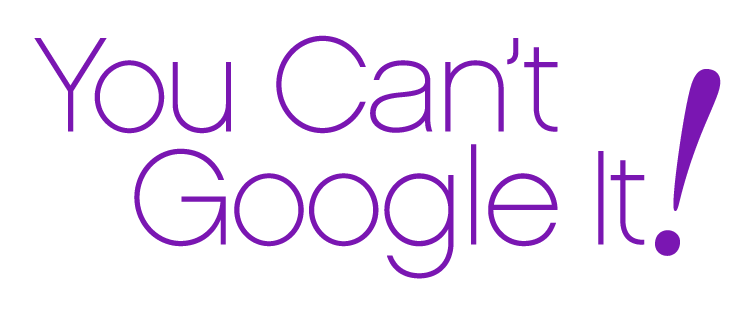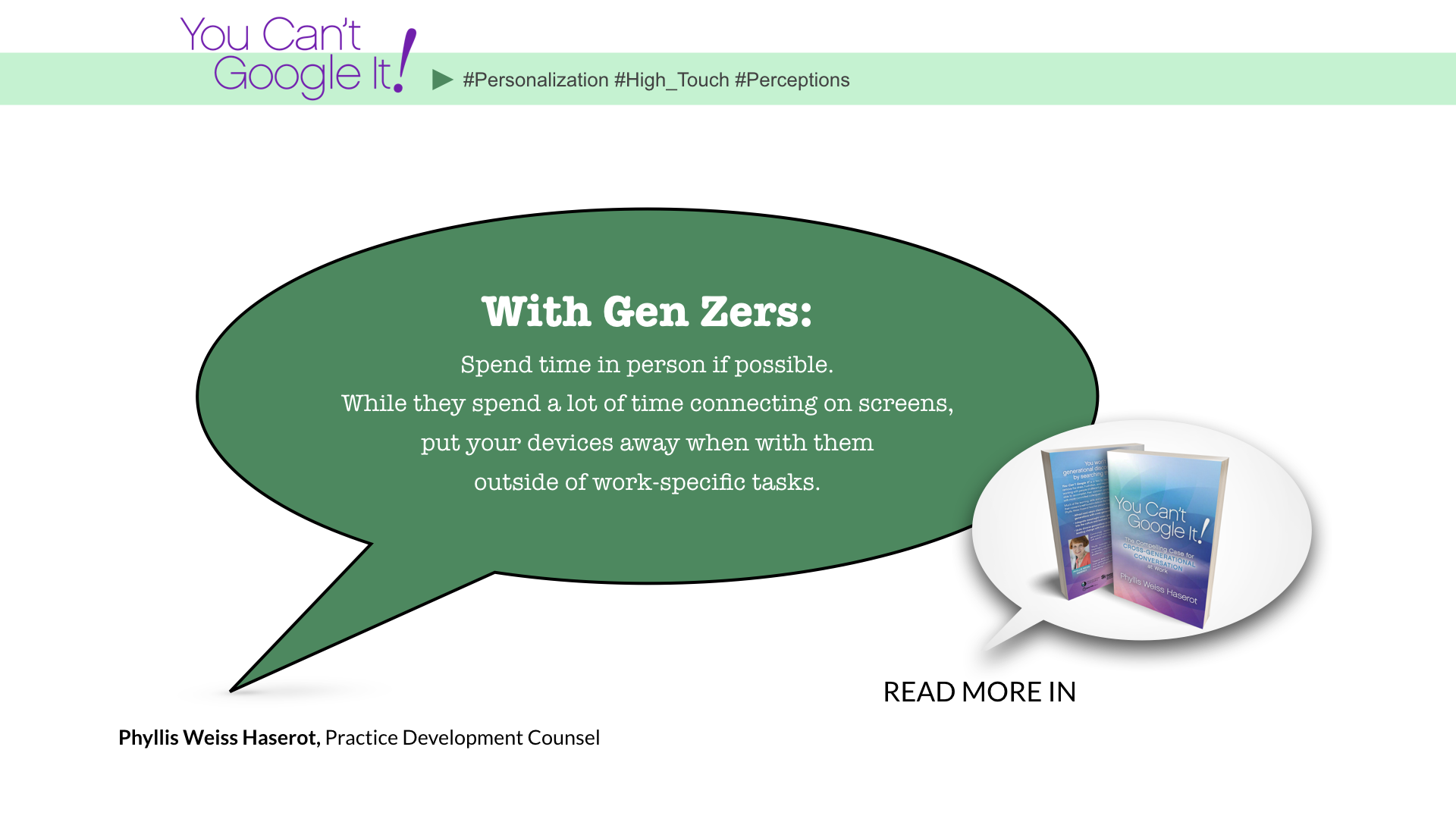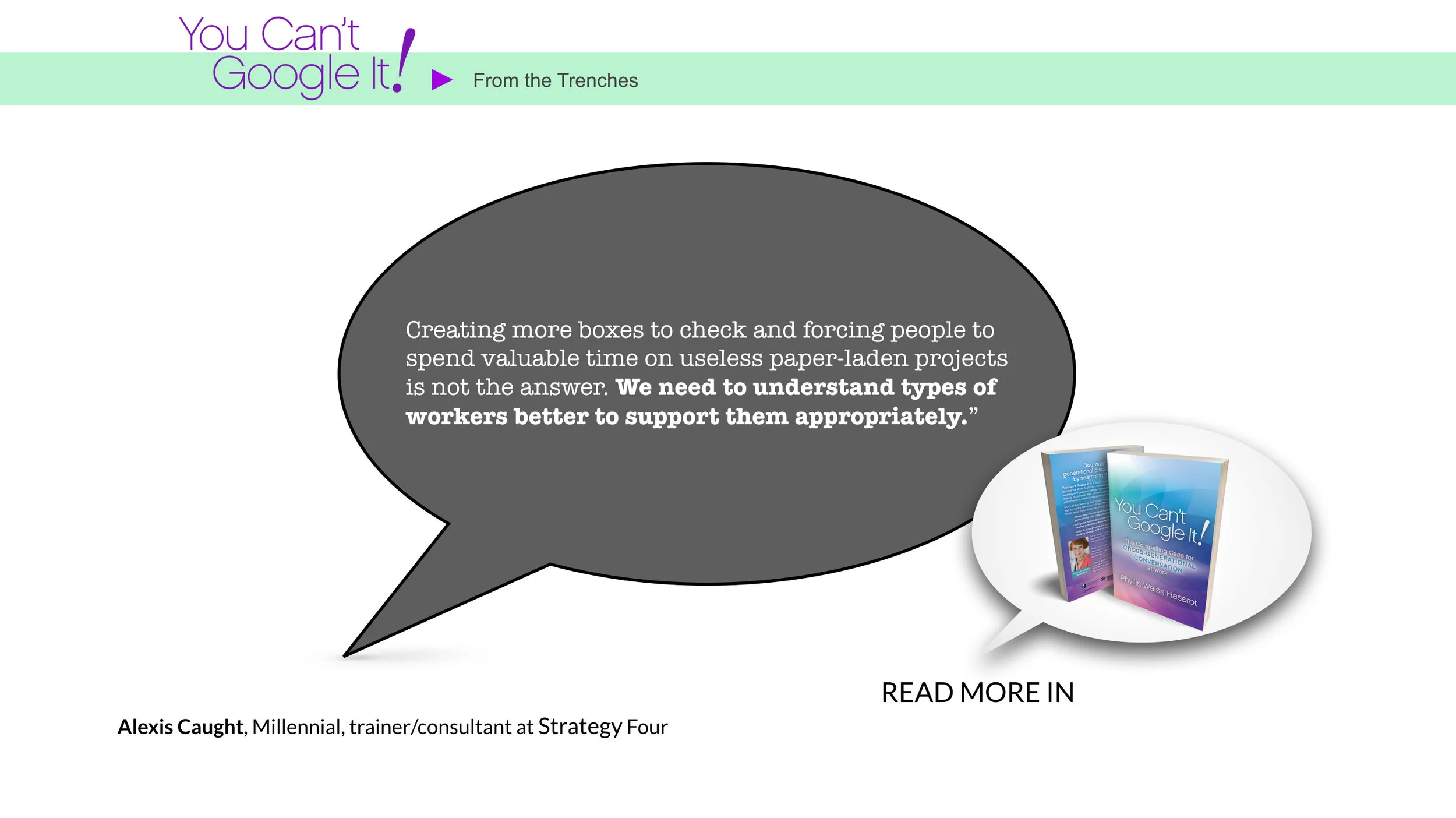Moments
Each generation seems to have its own generational stubbornness that can act as a roadblock to best intergenerational working. The best way of overcoming these is by talk and sharing so that we understand where each is coming from and develop middle working ground. – Alexis Caught, Millennial, trainer/consultant at Strategy Four
Millennials are right to push back against those who lump all people of their generation together in one bundle of characteristics and attributes (both negative and positive ones). But they often do the same thing when talking about and comparing themselves to Boomers.
Without cross-generational conversation we will not understand how to address different generations for business purposes. “I don’t think you can sell or teach the different generations if they don’t help you to structure your services and channels of communication.” (Kevin Doolan, Boomer, lawyer/consultant at Moller Professional Service Firm Group) [See Chapter 3 on Perspective and how to teach it.]
Why is it that so many professionals and executives fear showing emotion in business; fear showing the sides of themselves that define much of who they are and why they achieve? Many male clients have conveyed to me over the years the frustration that “nobody talks about feelings around here.”
Gen Xers are not immune to the “made to feel irrelevant” syndrome either. Will the Millennials leap over them in status before they can take the batons from the Boomer leaders?
The key to true confidence in navigating an organization during one’s early years is understanding the perspectives and expectations of those of older generations.
If you stick to your own assumptions, you will quickly become outdated. Your birthday is just accidental. Your
mind should be ageless. Your experience is enriched if you can share it.” (Sue Feldman, a leading-edge Boomer, former VP for Content Technologies at IDC Technologies, and current CEO at Synthexis)
“Knowledge and skills in a highly-specialized area can only be passed on by one generation to the next by working together on projects. (Mary Jane Augustine, Boomer, law firm partner)
The founder of the organization resisted letting go, passing power to a successor, and accepting a new role. In their homework for a retreat, I had him and a few of the most senior partners write about and begin to design their desired legacy so that their contributions would be made clear and they had something to look forward to in their new roles. Through a planned process, the transitions came to pass—peacefully—and several years later the founder is in altered but highly respected roles.
“I get people to be curious about each other. It enables meaningful conversations to start among people of different generations and other diverse factors.”
“Like any relationship, individuals all have proclivities and foibles and there are some attitudes or behaviors that are more common in one generation than another,” said Rachel Happe, Gen Xer, founder/CEO, the Community Roundtable. “And you have to be curious enough to get past that.” You can’t google that - the most effective way to fulfill that curiosity is through conversation.
Attitude is key. Networking should be approached with curiosity and a sincere interest in the other person. (See guidelines for each generation, P. 110-111.)
Passion and a desire to connect will make you an energy magnet when you reach out.
Today, even in a mentoring culture, people need to take initiative to design their own career path and a plan for their professional development. Younger generations understand this best.
With Boomers: Avoid all whiffs of ageism and treat them in the youthful way they perceive themselves.
With Gen Xers: Be super aware of external perceptions. Get feedback regularly from clients, and do your market research
With Millennials: Provide a lot of guidance and frequent feedback without seeming condescending or treating them like kids. Be authentic, transparent, and relevant to the moment.
With Gen Zers: Spend time in person if possible. While they spend a lot of time
connecting on screens, put your devices away when with them outside of work-specific tasks.
Creating more boxes to check and forcing people to spend valuable time on useless paper-laden projects is not the answer. We need to understand types of workers better to support them appropriately.” --Alexis Caught, Millennial, trainer/consultant at Strategy Four
My vision is to see Cross-Generational Conversation Day instituted in organizations all over the United States and beyond as a focal point for uniting the generations.
Employers taking part in Cross-Generational Conversation Day send a clear message that their organization is committed to the advancement of engagement, productivity, meaningful communication, and collaboration among the generations at work.











